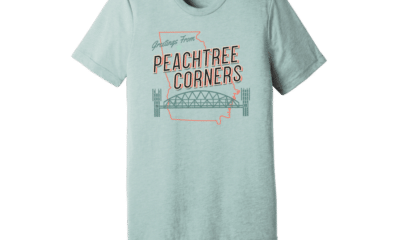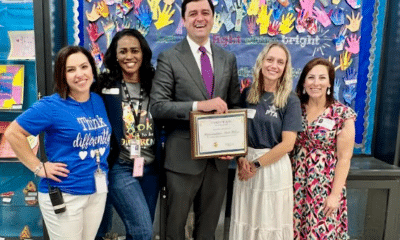Business
What Can Businesses Gain from a Chamber Membership? [Podcast]
Published
3 years agoon
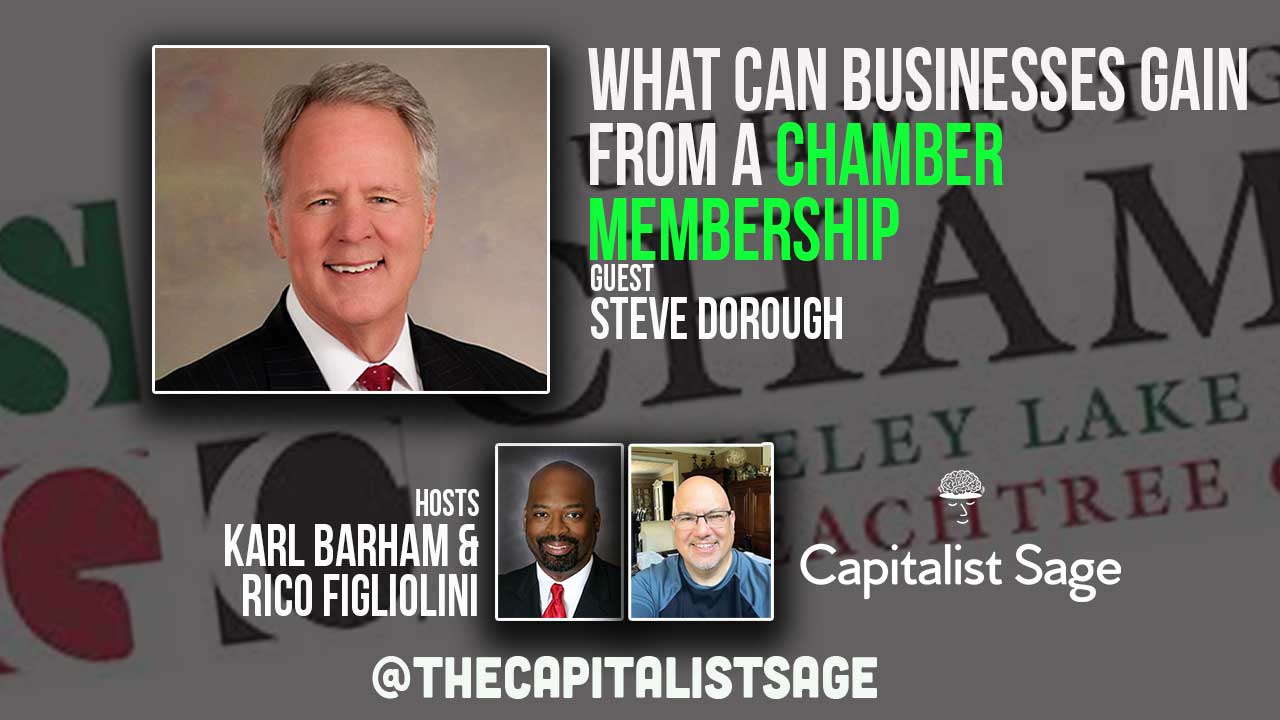
Local business chambers are important facets of any thriving community. On today’s episode of The Capitalist Sage, Karl and Rico are joined by Steve Dorough, President and chief executive officer of First Community Development and founding member of the Southwest Gwinnett Chamber of Commerce. Steve has years of experience working with nonprofit organizations to help them with developing their dreams and helping them transform their plans into reality. Together Karl, Rico and Steve discuss the value that local chambers bring to business owners and the entire community.
Resources:
FCD Website: https://fcdusa.com
Steve’s Email: SDorough@FCDUSA.com
FCD Office Number: (678) 906-4081
Timestamp:
[00:00:30] – Intro
[00:02:18] – About Steve and FCD
[00:04:20] – Importance of Chambers of
[00:00:30] – Intro
[00:02:18] – About Steve and FCD
[00:04:20] – Importance of Chambers of Commerce
[00:09:41] – Helping Small Business Owners
[00:13:47] – Gaining Leadership Skills
[00:16:32] – Voices in the Community
[00:19:45] – Changing Times and Challenges
[00:27:45] – Helping Young Business Leaders
[00:35:54] – The Future of Southwest Gwinnett
[00:40:12] – Get in Touch with Steve
[00:41:26] – Closing
Podcast Transcript:
[00:00:30] Karl: Welcome to the Capitalist Sage podcast. We’re here to bring you advice and tips from seasoned pros and experts to help you improve your business. I’m Karl Barham with Transworld Business Advisors. And my co-host is Rico Figliolini with Mighty Rockets, Digital Marketing, and he’s also the publisher of the Peachtree Corners Magazine. Rico, how are you doing today?
[00:00:49] Rico: Hey, Karl. Great, beautiful day outside today.
[00:00:52] Karl: It is, it is. Spring is here and we’ve got another great podcast today, but why don’t you introduce our sponsor for today?
[00:01:00] Rico: Sure. I want to introduce our sponsor, first time within the publication, EV Remodeling. It’s a home remodeling contractor. Eliad actually owns the business and lives in Peachtree Corners, great community member. So I want to thank him for becoming a corporate sponsor with Peachtree Corners Magazine and the family of podcasts that we do. So go ahead and visit them online at EVRemodelingInc.Com and tell him we sent you.
[00:01:29] Karl: Well, that is fabulous. I know a lot of people have been doing and will continue to do remodeling on their homes. So it’s great to have a new sponsor for the family of podcasts. W ell today it is my pleasure and honor to introduce Stephen Dorough, president and chief executive officer of First Community Development and also a member of the Southwest Gwinnett Chamber of Commerce. FCD as it’s known, works with nonprofit organizations throughout the Southeast and helps them with developing their dreams and helping them transform their plans into reality. So today we want to chat with Steve about local business chambers and the value that they bring to the business owners and the communities in general. Steve, how’re you doing today?
[00:02:15] Steve: I’m well. How are you Karl?
[00:02:18] Karl: Doing fabulous. I only gave a short introduction of all the many things that you’ve done to serve the community and in your professional career. Why don’t you tell everyone a little bit about what you do now and a little bit about yourself and how you got here.
[00:02:31] Steve: Sure. I’m born and raised over in Birmingham, Alabama. We moved to Atlanta about 30 years ago. My wife, Kim and I, and we have five kids between us, none together. And four of the five kids live here in the Atlanta area. My daughter and her family are in Homewood, which is a suburb south of Birmingham. And we have eight grandkids. So, we have been blessed to say the least. And we’re enjoying Peachtree Corners. As I said, we’ve lived here 30 years now and started the company, First Community Development back in 1994. So we do strategic planning, feasibility analysis, and we manage million dollar and up fundraising campaigns for what we describe as corporate driven nonprofits in the Southeast nine states. So that would include chambers of commerce, economic development authorities, downtown revitalization groups. Occasionally we’ll do education, fundraising, and cultural and performing arts. We have projects right now in Georgia and over in Mississippi. We just raised $15 million to help build the Mississippi aquarium down in Gulf Port. And we also raised $15 million over in Walton County to build their first YMCA in Walton. So it’s a fun business. It’s something that I’ve enjoyed doing now for, gee whiz, over 35 years. And we thoroughly enjoy helping communities kind of realize their dreams, transform their vision into reality.
[00:04:20] Karl: You are one of the key cogs in this movement that’s happened over the last probably 25, 30 years where you’re seeing downtowns and economic development happening in cities. If you go back to, when you said 1994 when you started, Atlanta, Metro Atlanta was a very different city back then. That was pre-Olympics, if I’m not mistaken. And the growth that’s happened in all of the suburbs around, has really transformed a life where everyone used to commute in Downtown, Midtown and all of this industry and living is developed outside has taken off here. I’m curious in your experience, what role have you seen local chambers of commerce as they popped up, play in their communities?
[00:05:08] Steve: Yeah, a local chamber of commerce is a great opportunity for business owners and business leaders to collaborate, to share their collective vision for a community. It’s a great opportunity for them to let their voice be heard. Obviously there’s strength in numbers and the Gwinnett Chamber is a great example of that. They’ve done a magnificent job over the decades in creating a sense of ownership, as far as the businesses here in Gwinnett County are concerned and giving them a forum from which they can plan and strategize and impact their local communities. So it’s, a chamber is it’s only as good as its membership, I guess we’ve all heard that. But the reality is that a local chamber is an opportunity for business leaders, business owners, to think outside their own businesses. To think more in terms of a community wide vision and initiative. So a number of great projects have been spawned through local chambers of commerce. And we’re pleased to have a chamber here in the Peachtree Corners, Norcross area called the Southwest Gwinnett Chamber of Commerce.
[00:06:39] Karl: It is. I mean, right now, when you think about legacies we are celebrating, actually this evening, 10 years of the Southwest Gwinnett Chamber. And you were here when it began. Can you tell us a little bit about how did it come about? What were the thought processes? What was the vision for creating this chamber, when there was a Gwinnett chamber and a Fulton and many others? What was in the thought process of those founders when they created the Southwest Gwinnett Chamber?
[00:07:07] Steve: As I mentioned a moment ago, 10 years ago, we certainly had the Gwinnett Chamber of Commerce and they were doing a fantastic business up in the north part of the county at Sugarloaf. And I began to talk with some of my friends over in the city of Norcross, Peachtree Corners, had not yet been organized as a city. We were at the time a part of a unincorporated Gwinnett County. But a number of us began to chat about the need for a business organization down here in Southwest Gwinnett. The Gwinnett chamber at the time had 2,500, 3,000, business members but they didn’t have a significant presence here in Southwest Gwinnett. And my experience through my company, working with hundreds of chambers of commerce around the Southeast is that that local chamber is critically needed. One chamber cannot represent, oh gosh, 40,000 businesses in Gwinnett county. As I just shared, it only represented about six or 7% of all of the businesses in the county 10 years ago. So I said, why don’t we organize? Why don’t we establish our own chamber of commerce down here in Southwest Gwinnett? There was some resistance. As you can imagine, some of the municipalities here were staunchly aligned with the Gwinnett Chamber and they said, we don’t need our own chamber of commerce. We’ve got a great chamber of commerce up in the north part of the county. And I said, I totally agree. But we need our own local chamber and we can certainly collaborate, cooperate, partner, if you will, with the Gwinnett Chamber. But let’s establish our own chamber here in Southwest Gwinnett and so I found 20 good men and women who agreed with me and they became the founding board of the first Southwest Gwinnett chamber. And we were officially incorporated in 2012. In fact, this month in March of 2012. And we had our inaugural meeting of the chamber over at Atlanta, Northeast Hilton, and a big banquet lunch and meeting and we were off and running.
[00:09:41] Karl: I find it interesting, when you look at chambers and for small business owners to look at it in a couple of different dimensions. 3 in particular. What is it for the small local business owners being affiliated, whether members are getting involved in their chamber. The guy that owns a pizza shop or the local business in this community, how have you seen over your time it helped those types of community members?
[00:10:08] Steve: Yeah, the good chambers of commerce are focused on what they can do to help their corporate members succeed. I think that first and foremost is what a chamber can and should do. That should be the chamber’s mission. They can accomplish that Karl a number of ways. Certainly there’s the networking aspect and our Southwest Gwinnett chamber has a, every Friday morning, over at the Atlanta Tech Park location where the chamber is headquartered they have a coffee. And they invite both their chamber members, but also nonmembers to come over about 8:30 in the morning and sit down together for a cup of coffee. The coffee is free, the conversation is free and you have an opportunity to meet with 25 or 30 or 35 other business leaders and owners here in the area. Talk about your product or service, learn about other’s products and services, and have the opportunity to network. Secondly, I think, as I mentioned earlier, a chamber is a place where you can make your voice heard. And that was important to me, when we founded the chamber. That small businesses are the backbone of every economy. It isn’t the big businesses. It isn’t the one to make the headlines in the newspaper. No, it’s the mom and pop businesses. They represent easily 85%, 90% of the economy in every community where they’re located. So having a chamber of commerce here in Peachtree Corners, Norcross, Berkeley Lake, those were the three communities that we had served with the Southwest Gwinnett chamber. To reach out to them and say, come join this chamber and your voice will be heard. We will certainly support you in terms of things that you’re trying to accomplish here. We’ll also defend you against things in our community that may thwart your business success. So, being a part of an organization that’s larger than just your individual business, having the opportunity to market your product or service through networking, making sure that your voice is heard throughout the community and on any particular issue with which you are supporting or combating. And then finally the opportunity to give back. We’re all blessed to live in an economy such as the one we have here in Gwinnett County and Metro Atlanta. So a chamber of commerce is an opportunity for you as a business leader, as a business owner, to give something back to your community through the chamber. So I think those are the primary ways. There’s the leadership aspect as well. Early going with the Southwest Gwinnett chamber, we offered courses in corporate leadership. So if you had an employee or a second or a third in command at your shop that you wanted him or her to have the opportunity to gain some leadership expertise, the chamber hosted a number of leadership programs over the early years to give local business owners and managers the opportunity to extend, expand, enhance their leadership skills.
[00:13:47] Karl: You’re hitting on a theme there that I think is important to note. For example, in that leadership training and professional development, there are some things that are better done as a collective than trying to do individually. And that’s a great example. If each small business owner hired managers and so on and wanted to upskill them in leadership, it probably gets cost prohibitive individually to get training and find it. But a local chamber can offer professional development in the form of leadership and others where it’s close to that community, that local Southwest Norcross. People could go after work, they can go during work and get back quickly. Upskill them where individually they couldn’t do that.
[00:14:33] Steve: Absolutely. The course that we taught was called the leadership challenge. It was a very popular course out in California. We did the math. If you as a business owner had two or three employees that you wanted to involve in a program like that you would pay somewhere in the four to $5,000 range to have those three employees participate in the program out of California. Having the Southwest Gwinnett chamber kind of purchase the rights to the program to be able to teach it here locally, we were able to charge I think it was just $800 for the full program. So you can see the cost savings involved. But again, we would have Karl, 20, 25 members in the class, each time we taught it. And there was another opportunity for them to network to get to know one another better over the eight or nine or ten sessions that we had once a week, same night of the week. Betsy Pickrin, from the chamber, and I co taught the class and it was, it was amazing. It was wonderful to see a group of people like that who wanted to expand their skillset to be better leaders. We taught things like modeling the way and feeling for your employees. Being the kind of leader that you would want to follow. We had some young people in the class, we had some older people in the class. It was a great mentoring opportunity and a great relational opportunity as well. So I’m proud of the chamber for having the initiative to put something like that together. It was Betsy Pickrin’s idea at the time. And she did a wonderful job in organizing and engaging folks here in the greater Peachtree Corners, Norcross, Berkeley Lake area, Southwest Gwinnett for the leadership challenge.
[00:16:32] Karl: I think you highlighted something great with Betsy and my first exposure to the chamber was through Betsy at our morning coffee in Atlanta Bread Company. At the time I walked in after a workout, I was picking up something and I saw a bunch of people meeting with, and a lady with a big Southwest Gwinnett shirt on, red shirt. And I walked over and I asked what was going on. And she started chatting with me and invited me to join and become involved. And I think what you’re highlighting there is the ability for folks to connect with other business leaders and exchange ideas and form friendships and bond. I always say being a business owner sometimes can be very lonely. You can’t talk to your employees about everything. Sometimes your spouse doesn’t want to hear about what’s going on. Versus when you’re in a large corporation, you go to coffee or lunch with your colleagues. A lot of business owners don’t have that. And the chamber serves as a vehicle, a platform to form those connections. To talk about marketing strategies, and HR strategies, and different ways. Because people need someone to talk to and get advice from. You also highlighted another one. That having a voice in the community. Can you give an example of ways that the Southwest Gwinnett chamber helped have a voice, bring a voice to business owners in the community?
[00:17:59] Steve: Yeah, we certainly, from time to time, we’ll get contacted by one of our chamber members who may be struggling with an issue involving zoning, involving infrastructure like sewer or water or electricity. Not getting the right power to their businesses, that sort of thing. And again, the chamber of commerce is a business collective. It’s a cooperative. It’s the opportunity for you and others to bring your issues, bring your obstacles, bring your impediments to a chamber of commerce and then allow the chamber to speak on your behalf at a local city council. At the Gwinnett County commission, other organizations in the community. So we’ve certainly had those kinds of opportunities over the last 10 years. And I was a part of some of the studies where we reached out to a local organization or to a local government to try to right a wrong that was somehow impeding, not necessarily one of our members. Though, I think the members were the ones who brought the issue to the chamber to begin with. But also to represent other businesses who are not chamber members, who are not having the clear opportunities to succeed because of a regulation, of an ordinance, a tax, or something like that, that a city or a county was trying to impose in the area. And so that’s another reason to have a business organization, like a chamber of commerce, especially in the local community. And I think the Southwest Gwinnett chamber has done its very best to represent its business constituents.
[00:19:45] Rico: Do you, Steve, do you find in the course of time, things change a little bit, right? Types of companies, some more high-tech, more service oriented versus product oriented, younger people coming into the fray. As well as actually those that were downsized during COVID maybe even, starting their own businesses. Do you find anything different, any special challenges chambers face or that chambers have found that they can provide solutions for new challenges that these particular groups of people face?
[00:20:20] Steve: Yeah. You make a great point, Rico. Obviously over the last couple of years, the entire business landscape has completely turned over. Things that we were doing back in 2019 seem completely foreign to us now. I think we’re always going to have virtual conversations, virtual meetings like this. I was on two calls this morning they were both video calls. I’m going to get to go to a business lunch in one of the communities we serve tomorrow and I’m excited for the opportunity to be face to face with some of our clients for a change. So yeah, we’re going, and every good chamber of commerce has to reinvent itself regularly or it’s going to grow stale. And very quickly it’s going to cease to serve the current needs and interests of its membership. So if anything, a chamber of commerce should be on the cutting edge. They should be leading the way in terms of this type of metamorphosis and technology overturn. Very early in my career living in Birmingham right out of college, I went to a small liberal arts college, birmingham Southern college, which is a United Methodist church supported. I was going to be a Methodist minister when I graduated from college. I changed my mind, decided I wasn’t a good fit for the pulpit when I was a junior in college for a number of reasons. But the only job that was available to me when I graduated was working for First United Methodist church in downtown Birmingham. So I was the full-time youth director at First Methodist church for three and a half years. The very next job that I took was to walk directly across the street to the Birmingham area chamber of commerce. And I worked there for the next five years as director of their membership. And the Birmingham chamber gave me an excellent introduction to how businesses should and should not be run. I learned so much as a 20 something year old in Birmingham, Alabama. And just watching all of our business leaders who came through that chamber, who served on the various committees and on the chamber board of directors. And I had the opportunity to staff a number of those committees as a chamber employee. So that when it was time for me to get my own business, I knew the type of business that I wanted to run based on what I’d seen others do. And so creating First Community Development back in 1994 was simply assembling all the pieces, all the parts that I had absorbed, that I had collected over the 20 something years of being in business. But more than that observing business. So a good chamber is able to help its businesses continue to morph to help its businesses continue to grow, to find areas that businesses need to understand as they adjust their business models to keep pace with the current economy. So the very best chambers are the ones that are not so much about winning awards or hosting big events, but they’re more about what can I do to help each of the individual businesses and industries that are members of our chamber or that reside in our communities be better, keep pace, succeed. Obviously if those businesses are succeeding, the old adage, a rising tide lifts all boats. So a good chamber of commerce is helping all of their business members to continue to succeed and raise the economy in their local community.
[00:24:47] Rico: Yeah, I agree. I think that companies that are involved in the chambers are able to support those companies well enough. The energy just from that, from the success of that. People willing to then come back to meetings, come back to events. Because it’s not just, like you said, it’s not just a party, right? Sometimes it’s learning, it’s a workshop. It’s being able to find out the little things like, how to make sure your, LinkedIn profile, your social media profiles are working for your business. Or cutting the tape, like you said. If there’s relationships within city governments that the chamber has. And a business person is opening a second location, but they need help because the red tape is choking them. Then maybe the chamber’s relationships thing can be able to help that. Yeah.
[00:25:33] Steve: Obviously Rico there’s strength in numbers in having a business organization that represents a a hundred, a hundred twenty five, a hundred and fifty businesses in the area. And that’s a very small chamber. I mentioned the Gwinnett chamber 2,500 plus members. So a very strong advocate for local business is one of the strengths of a vibrant and active and engaged chamber of commerce. So I think a chamber is certainly not the end all and be all, but I think a chamber is an important factor in any successful community. That they’re able to engage their business, their corporate leadership, but also give that voice the opportunity to be heard in local government, in regional government, in plans for the area and so forth. We’ve learned over the years that an elected official really ought to listen to their local business leadership because it’s that local business leadership that is the backbone of the economy in that community. And if a local elected leadership are going to do things that thwart their local business and industry, then it’s a recipe for disaster. And there are a lot of failed communities that if they were prudent, they could go back and say, you know, it started 20 years ago when we began to work against our local businesses. So that’s not happening here, and I’m excited about that. Peachtree Corners, the city of Norcross, are both strongly supportive of business and industry here. They get it. They understand the value of a good local retail and service oriented businesses, and they are willing to open their doors, open their committee’s open their visioning processes to include business leaders as a part of those communities and in councils.
[00:27:45] Karl: Steve, can I ask a question? So in a couple of hours, there’s going to be a big party in downtown Norcross at the Brunswick location for the tenth anniversary. And folks like yourself will be there and will meet some people. If a young businessperson, leader, I’m going to use the word leader, comes up to you in the community and he’s says, where do you see, based on your history, where do you see chambers like the Southwest Gwinnett need to go into the future? What wisdom would you impart to a young up and coming business leader?
[00:28:17] Steve: We started this chamber 10 years ago Karl, with the idea that we wanted to support small and medium sized businesses in Norcross, Peachtree Corners, and Berkeley lake. And I think the Southwest Gwinnett chamber has done exactly that. We can do more. I teach a Sunday school class at Simpsonwood United Methodist church and we talk about the fact that the church is full of sinners as it should be. And we’re all trying to do better each and every day. So it is with the Southwest Gwinnett chamber. Beth Coffee is our executive director over there, Marty Acef is our current chair woman. They’re doing a fantastic job of continuing to try to build this chamber to be all it can be for our community. So 10 years from now, I would say if you join the chamber today, 10 years from now, your business will be in a better place. You will be more knowledgeable of all the things that are going on around you. Hopefully you’ll be a better corporate leader as a result of mentoring with other corporate leaders through the chamber. I think there’s a great opportunity for us to be more engaged in our community, more focused inward as well as outward here in the Southwest Gwinnett corner of our county. So yeah, I think the Chamber’s in a great place. There are occasions that I’ve had the opportunity to sit in a chamber meeting here in the last several months. We have a First Friday breakfast every first Friday of every month. We have that Friday coffee on every other Friday morning during the month, except for first Friday. And Karl I’ve been able to sit in those meetings. And again as a Christian, I try real hard to monitor my sense of pride, but I’m proud as to where this chamber is, where it’s come over the last 10 years. I look around me in those meetings, and I think yep. This was the idea we had in mind. This is why we started our local chamber here.
[00:30:39] Karl: So one of the things that essentially I’ve been having conversations with folks when it comes to chambers, and if you read most literature on chamber of commerces, and most conventional wisdom people would think people join chambers to network. And the answer is to that, I think it’s very true. What I think people miss and may not appreciate it as much is one, as you started to mention about leadership development, I remember working in large corporations where when people were going for promotions they would have to talk about their achievements. They would have to talk about ways in which they’ve led. And if they’re an individual contributor in a company, they may not have had the opportunity to lead people in their company but they’re going for a promotion to do that. So the question we were trained to ask, other ways in which you’ve led. Whether it’s in your church, it could be in sports, it could be in the community. The chamber for those out there that may have their own company or even work for small, medium size, larger company. It’s a great way for individual leadership skills. You’re networking, you’re working on projects, you’re there collectively. You’re doing those things that people are looking for behaviors and evidence of before you get that promotion. So I’d say to all those companies in the Southwest Gwinett area, if you’ve got leaders in your company and you want to develop them it is a great avenue in partnership to help not only through formal professional development and opportunities to lead in activities. And I’ll point to a few, just to highlight the Gwinnett Chamber. You talked about making a difference and the impact they can have in the community. Sometimes it’s tough for companies on how to integrate with some of the great nonprofit schools, the different areas. The chamber has a long track history with vetted organizations that provide opportunities to mentor, lead, volunteer support. And the local high school Norcross, Wesleyan, Great Atlanta Christian, Cornerstone and others there are career nights and events that the chamber members are asked to participate in. If you think of junior achievement, which is a beautiful component of the education system here in Gwinnett and all around. The chamber volunteers at the local middle schools several times a year. And even more specifically there is right now, currently, if you go to the chamber website, there is a current campaign, for cell phone charger in hospital, partnering with Northside Hospitals. And when people are in there for extended stay and they need to charge their cell phone, there’s a station so the nurses don’t have to lose all their chargers and look for them after patients are going. And we’re partnering with them to raise some funds, to put those in North Side. One of our local members and hospitals to do that. So that’s where collective action really has an impact. And really you don’t get into that unless you’re engaged, you’re participating in the chamber.
[00:33:41] Steve: Yeah, I agree Karl. I think on a very basic level, the chamber is kind of a win-win, win-win situation. If you think about the fact that, if you’re a young businessman, business woman here in the Southwest Gwinnett area and you’re, you’re stuck in your business. I’m saying stuck loosely, but you’re nine to five or you’re in this day and time, your eight to six at the business. Here’s an opportunity for you to get out and see the rest of the community. Here’s an opportunity for you to get out and meet other business leaders, other business minded people, your business certainly gets a benefit from that. The business that you represent, their brand gets out into the greater community as a result of your participation. You personally have opportunities to grow as far as your experience, as far as your expertise, as far as your leadership is concerned by participating in an organization like the chamber. And then obviously it’s an opportunity for you to represent a business that may need its voice heard on a particular matter. And it gives you the opportunity to pursue some leadership roles in the chamber. If you want to serve on the board of the chamber, if someday you would like to be chairman of the chamber. Again, all of that is available through an organization like the Southwest Gwinnett Chamber. And I think people should take that opportunity. It’s not expensive. It’s a very reasonable membership fee, but at the same time, you get a wealth of knowledge and understanding, and experience, and expertise. And you’re giving back to the greater Southwest Gwinnett community in the process. So all of the things you mentioned are something that you probably would not experience if you were not a part of the chamber and didn’t have access to all of those kinds of opportunities.
[00:35:54] Karl: Absolutely. I’m curious Rico, as you’ve seen Peachtree Corners grow and evolve as a city and as a chamber, you’ve been here for all of the time, all the 10 years of both the chamber, as well as the city’s time here. I’m curious in like your perspective as someone that, I consider you someone that watches things around you and able to present it to people in creative ways. What do you see as the future for chambers in general, and Southwest in particular?
[00:36:25] Rico: Interesting, because I was just thinking about that the other day, as far as what is a chamber? What traditionally does a county chamber, business chamber do? Which is a grand thing they do, right? Because they’re lobbying state legislators as well as doing work in the county level, a little different right there. They’re bringing in businesses, their soliciting, they’re enticing businesses to relocate into a county. A little different, right? Southwest Gwinnett Chamber, I don’t see that way. So it has a different mission, like Steve has been saying. So I, it is challenging out there. Certainly in the last two years, I have seen different businesses have so many challenges. How to prospect, how to reach out to a customer base that normally would be reached out by phone or reached out in an office visit that couldn’t be done over the last two years, really for the most part. So how does a chamber evolve to be able to address some of those needs of their membership? Pretty much in the last two years, you know, looking to find direction on how to do these things. I think the networking part of that has helped more greatly than anything else, because I think that as you mentioned before, call us a collective. We can bounce ideas off each other or we find ideas that we didn’t know about. All of a sudden from a different member that has, is doing something, is reaching out in a different way. We’re all, think we’re the center of our own universe, but we don’t know everything. And it’s good to be able to find. I’ve found so many different ways to do business over the last two years that I never thought of before. And part of that came out of sharing information with you, Karl, and with a lot of the business leaders that we’ve met with. Just little kernels of things that you pick up. Things that I think we’ve all evolved and learned from. So it’s challenging. It will never end. There’s more challenges ahead of us. But I think if we’re working together and we’re willing to keep an open mind, I think that the chamber and these types of organizations like the business association, can provide a lot. You don’t have to Google these things or YouTube it. You can just go right through the chamber meeting and meet up with some friends. Good stuff there. Just have to dig for it, that’s all.
[00:38:44] Karl: Yeah. Especially as you think of millennials and other parts of generations coming in, I think morphing to find their platforms and how to communicate and engage with that demographic is going to be something that the chambers in the forefront are going to wrestle with and figure out. And all those home-based businesses and technology-based businesses, let’s listen to what they need, how it’s different? And how can we serve that portion that is growing in every city, every community around. Especially here in Peachtree Corners, we’ve got Atlanta Tech Park, we’ve got the whole Curiosity Lab. These tech businesses are coming fast and furious and chambers have got to learn how to embrace that type of business as well and provide value there as well. Well, Steve, I want to thank you so much. Let me reintroduce Stephen Dorough, who is the president and chief executive officer of First Community Development, and one of the founders of the Southwest Gwinnett Chamber. I want to thank you personally, and for the community, for the service that you did. It’s hard to create a thing and to start it. And I think you were one of the right leaders to do that based on your experience. And I hope you could take some pride, humble pride in what it has evolved in over ten years. And more importantly, what it’s going to do over the next ten. So thank you. Thank you for your service and sharing your insight on the chamber.
[00:40:11] Steve: My pleasure.
[00:40:12] Karl: One thing Steve I want to ask is if someone wanted to reach out to you, what is the best way to get in contact, to learn more about First Community Development and, or just meet you for a cup of coffee.
[00:40:23] Steve: Sure. Reach me at SDorough, and that’s spelled just as you see it on the screen. S D O R O U G H @ F as in Frank, C as in cat, D as in dog, USA dot com. SDorough@FCDUSA.com and our office number is (678) 906-4081.
[00:40:52] Karl: Excellent. Thank you so much. Anything you got planned over the next, let’s say five hours. You want to share with everybody?
[00:41:02] Steve: We’re looking forward to the 10th anniversary party for the chamber tonight. And that’ll be a nice affair and we’re looking forward to participating in that. Other than that, I think two of our granddaughters are coming over and spend the night with us tomorrow night. We’re looking forward to that. This is a great time of the year, to Rico’s point, we all need to get outside and enjoy this nice weather.
[00:41:25] Rico: Yeah.
[00:41:26] Karl: Absolutely. Thank you so much for joining. I’m Karl Barham with Transworld Business Advisors of Atlanta Peachtree. Our business is working with local business owners, whether they’re looking to improve their business, whether they’re looking to grow their business, especially through acquisition or when they’re ready to exit their business to go on to do other things. You can schedule a consultation at K Barham, that’s K B A R H A M @TWorld.com. Or visit our website at www.TWorld.com/AtlantaPeachtree. There is a business valuation calculator on there. You put in information, get an idea what your business is worth, and also a special tool for those looking to become their own boss. We call it buyer match. You can go in there put in information of the type of business you’re looking for, and you will get a whole series of opportunities. Not only here in the Metro Atlanta area, across the country, businesses that might be the right thing for you. So you can then become a member of a local chamber and help to grow your business and your community. Rico, what have you got going on?
[00:42:36] Rico: Sure. Well, before we get into that, I just want to give a plug for you actually, because I’ve learned a lot over the years from you, Karl. I’ve learned a lot about preparing my business for exit, if I want to get there. How to grow the business, what to be looking for when hiring for this business. I mean, just shooting, just even just talking and shooting ideas off you. I mean, it’s just been, it it’s been a good, two, three, actually going on four years, maybe? It’s been four years almost, right. So a lot. So people should check you out because they can learn quite a bit more. And if they continue watching these podcasts, like Steve here. I mean, there’s a lot of good knowledge coming out of these podcasts. As far as what I’m doing, we’re working on the next issue. So it doesn’t stop, right? Peachtree Corners Magazine, we’re putting that to bed by the end of the month. We have faces of Peachtree Corners, is our main feature. So we picked out twenty people that are faces of Peachtree Corners. Different age groups, different experiences to just to give their mini profiles about who they are and just some of the people that make up this community. Plus we’re covering stuff like the purchase of the Forum on Peachtree Parkway. So that just closed last Friday, we’re putting together an article. We’re interviewing one of the owners of North Atlanta Properties today I think. And we’re going to be putting that article out shortly. We’re covering stuff more so than ever before, online at LivinginPeachtreeCorners.com. So if you want to find out what’s going on in the city, certainly feel free to, you know, sign up for that. As far as other work Peachtree Corners Magazine is just one of what we’re doing. We’re launching Southwest Gwinnett Magazine in about another month or so. That’ll be out in the beginning of May. So that’ll be covering Southwest Gwinnett area. Peachtree Corners, Norcross and Burkley Lake, parts of Duluth, unincorporated Gwinnett County. So that’ll be a bimonthly also. So that’s alternating between Peachtree Corners Magazine and Southwest on different months. So a lot going on there and by the way, if you need social media content. If you need online management of your content or your social media or your brand work. You can reach out to me. My company’s Mighty Rockets. I’ll certainly be able to speak to you about that and follow Capitalist Sage. The Instagram handle that we have along with Peachtree Corners Life on Instagram as well. When you find out all sorts of things going on.
[00:44:57] Karl: Wow, that sounds fabulous. Well, thank you Rico for your service as well. And putting out this great information and, and being a great member of the community. We need all these different types of creative minds and influences to build a strong community. And if you watch the news and you see what’s going on, Southwest Gwinnett is the place to be. Norcross, peachtree Corner, Berkeley Lake and surrounding areas is on fire. And so I’m looking forward to celebrating some of that tonight with everybody. Thank you again for joining the Capitalist Sage, and then continue to follow us on all of our social media and platform links. And we look forward to chatting with you again in the future. Take care, everyone.
Related
Business
Peachtree Corners Grows Business Opportunities Through Economic Development
Published
4 days agoon
May 6, 2025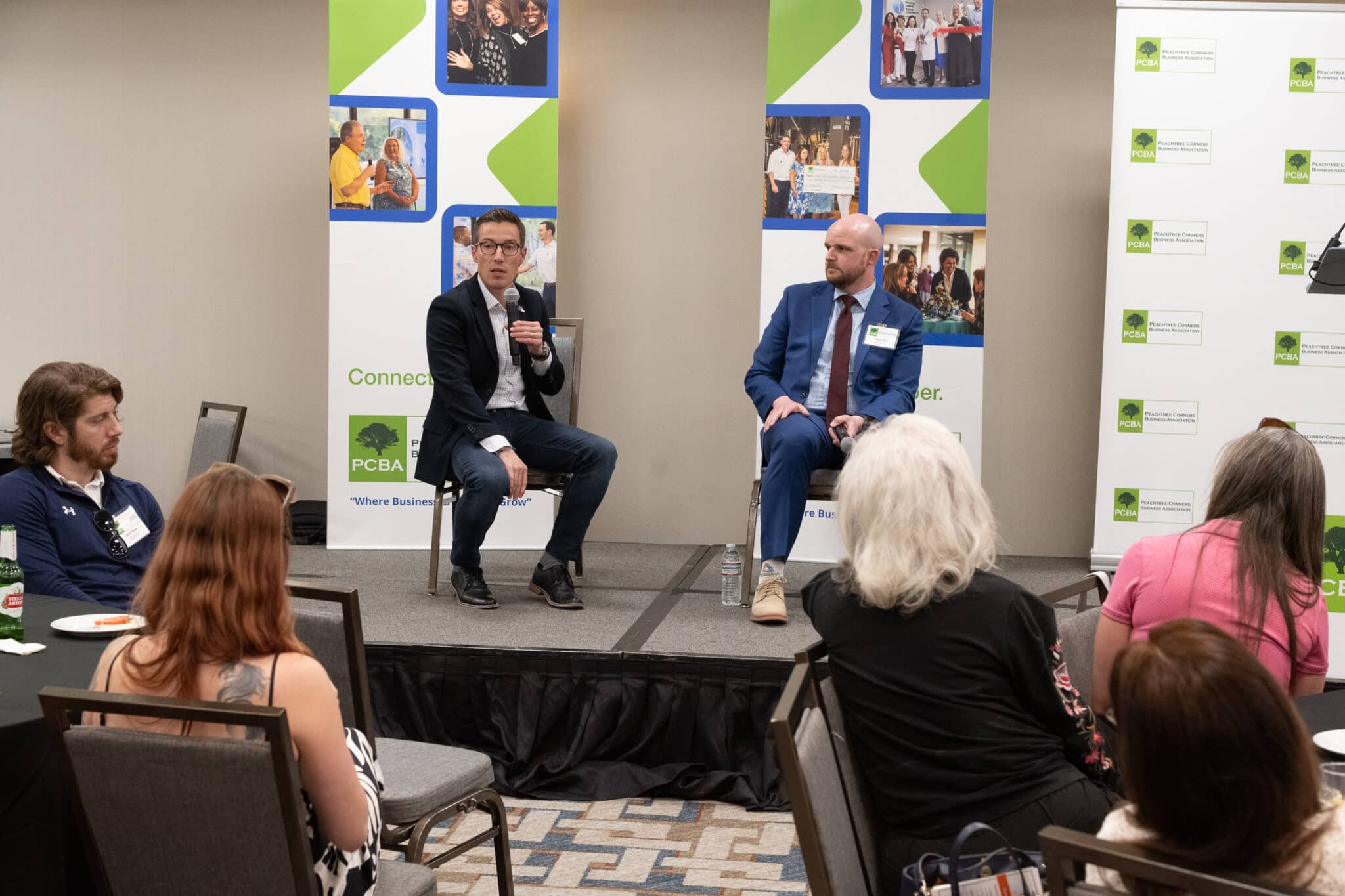
Most residents and business owners in Peachtree Corners probably think they know all about the economic development and strategic planning of Peachtree Corners, but do they really?
Peachtree Corners Business Association invited Peachtree Corners Economic Development Director Betrand Lapoire and Partnership Gwinnett Director of Economic Development Andrew Hickey to its After Hours Speaker Series on March 27 to discuss the city’s growth from a 1971 master plan to a bustling city with 42,000 inhabitants and 40,000 jobs.
Key points included the importance of business retention and expansion, with 24 projects last year creating 1,600 retained jobs, 1,600 new jobs and $250 million in new capital investment.
The Curiosity Lab, a world-class innovation center, was emphasized as a significant attraction. The city’s zoning and infrastructure plans were also discussed, focusing on balancing office and residential development to maintain a vibrant, sustainable community.
Matching jobs to residents
Although Peachtree Corners is just a teenager in terms of being an incorporated city, the foundation for this vibrant, fast-paced economic hub was laid more than 50 years ago by technology pioneer Paul Duke.
“Peachtree Corners was the first master-planned, business innovation technology park in metro Atlanta,” said Lapoire. “It was in response to the brain drain of technology with Georgia Tech graduates leaving the area.”
While the city may have a small-town feel, it’s the largest in Gwinnett County by population, but not land mass, he added.
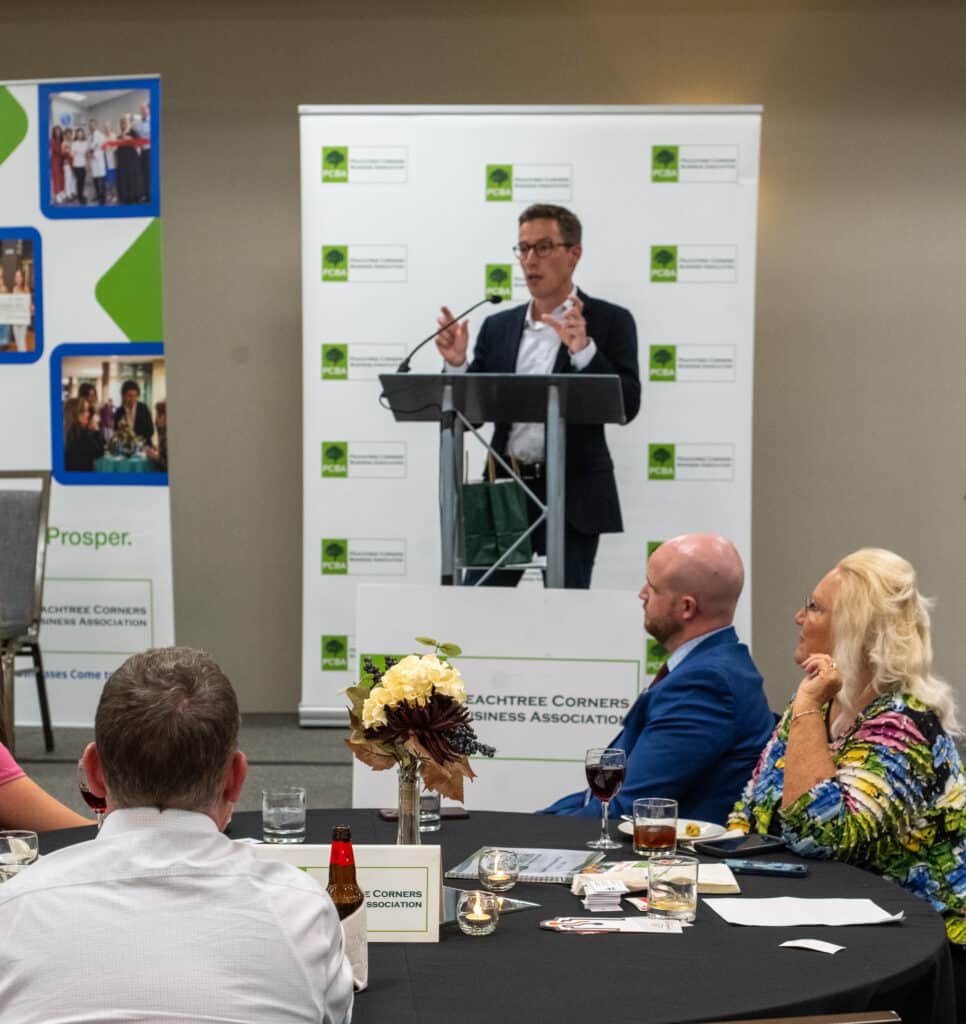
“The city started from a commercial, industrial, R&D base and then was expanded around it,” said Lapoire.
Though home to more than 42,000 residents, most of the jobs in Peachtree Corners are filled by people who live outside the city, he added.
“So we have this interesting mismatch, in a way, although not unusual,” said LaPoire. That creates traffic and transit issues. So that means that one of the solutions is to create more jobs here to fit the profile of the community.”
He presented charts that show professional services, consulting and engineering as the largest job categories. The next tier of businesses are wholesale and manufacturing.
“So we have a good mix of industry,” he said.
A five-year plan
The city has a five-year economic development plan (2023-2028) that outlines strategies for attracting and retaining businesses, with education and workforce development being key components.
Partnership Gwinnett has similar goals as Peachtree Corners, but on a larger scale.
“We are the county’s sales and marketing arm for all 17 cities now, and we receive funding from both municipal sources as well as existing businesses here — both in Gwinnett and outside of Gwinnett as well,” said Hickey.
He shared how Partnership Gwinnett is designed to drive a lot of major corporations toward doing business inside and with Gwinnett County.
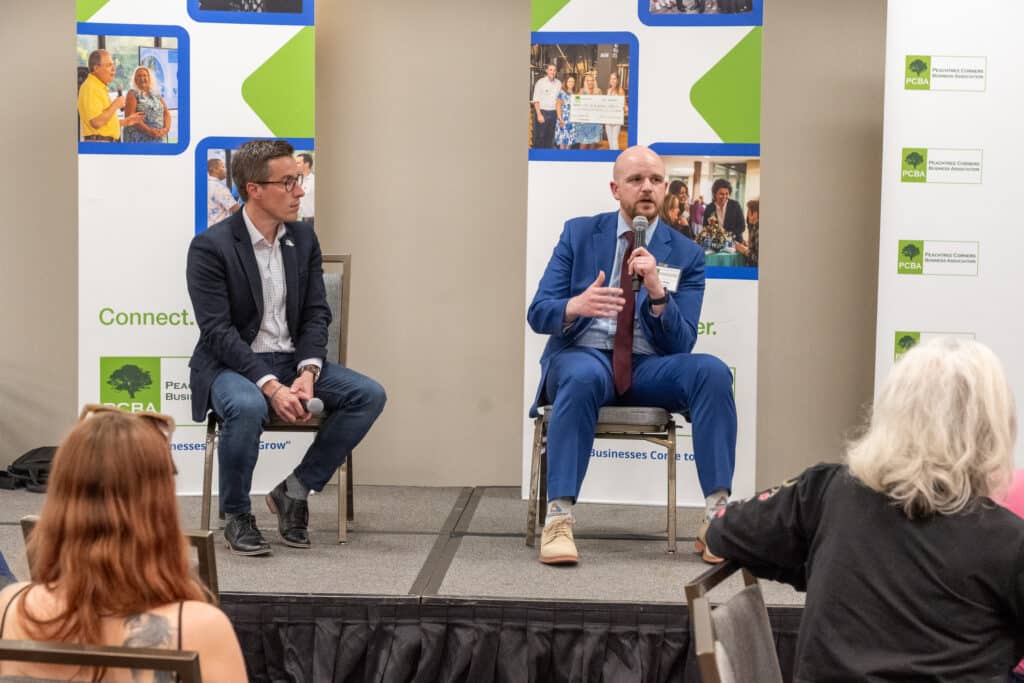
“One of the biggest things that we talk about that I’m sure it seems like most of us here, if you live here, you work here, you understand it. It’s the diversity that exists here in Gwinnett,” he said. “With a diversity index of 85, that means if we walk out of the Hilton here and we say hello to somebody, there’s an 85% chance they’re from a different ethnic or cultural background than ourselves, which to you and I may seem normal because that’s the life that we live in.”
He added that for companies, there’s a tremendous value in that, whether they have stated values, or they’re just making hiring decisions to get a wide range of candidates to fill those roles. Additionally, because of the proximity to Atlanta, Gwinnett County has a great labor draw.
Partnership Gwinnett
Partnership Gwinnett plays a significant role in recruiting businesses, expanding existing companies and developing the workforce. Hickey showed how the organization was involved with more than 24 projects last year.
“A majority of those were expansions, and that is a common thread you’ll see in economic development,” he said. “In business retention, expansion is so vital to working with our existing companies to make sure that they have the resources they need.”
He added that’s what leads to new investment and job creation in the community.
The organization also focuses on redevelopment projects, working with cities and the county to improve infrastructure and community amenities — especially strong educational institutions such Georgia Gwinnett College, Philadelphia College of Osteopathic Medicine and others.
Quality of life
In closing, both men stressed the importance of recruiting companies and developing the workforce, along with one aspect that means a lot but may not be as obvious — quality of life.
“It’s definitely evident that people like to work where they live — the whole live, work play experience,” said Hickey. “I joke that the part that people really have the most questions about, and are most excited to learn about, is new events at The Forum or Gwinnett Place Mall.”
Although they want to know what’s the next major company coming to Gwinnett, people REALLY want to know about how to spend their leisure time.
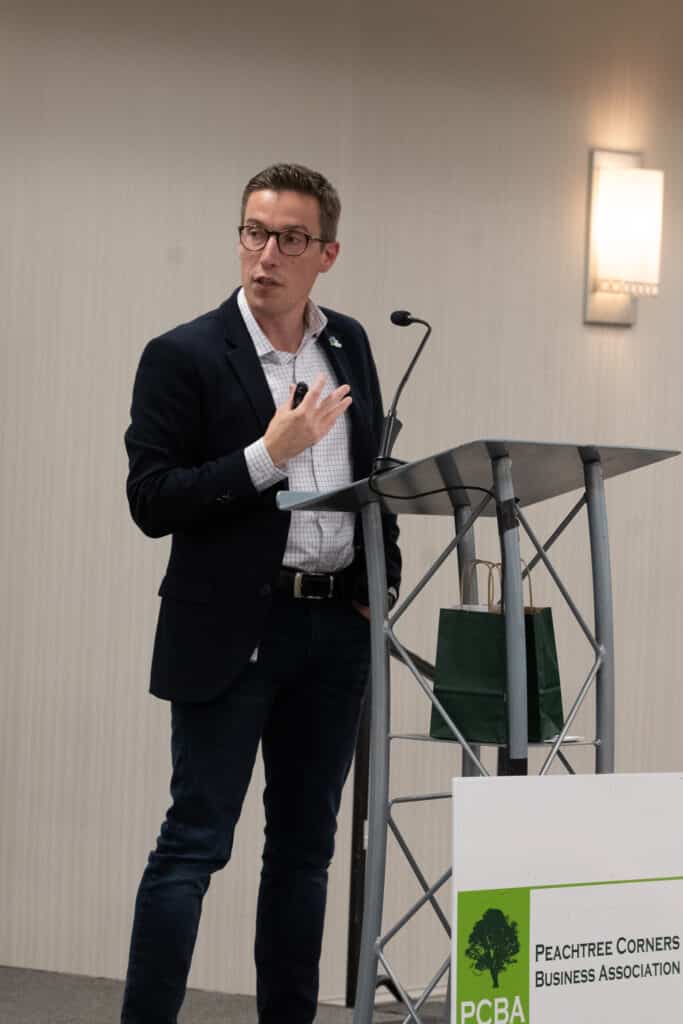
“That speaks to the importance of ensuring that we have a great community,” he said. “So at Partnership Gwinnett we work with all of our cities, and the county government as well, [on] a kind of a best-practices trip.”
He added that the peer tour allows everyone to know what the neighboring communities are doing and share the good news.
“We will take all of these elected officials, but also city staff, to different cities across the Southeast,” he said. “Last year, I believe they went to Huntsville, and have been to Greenville, Chattanooga — all cities that have done some really cool redevelopments that have taken their city to the next level. Our goal is to learn from them.”
Related
Business
Two Peachtree Corners Business Leaders Named Finalists for EY Entrepreneur Award
Published
2 weeks agoon
April 23, 2025
Ernst & Young’s Entrepreneur Of The Year celebrates ambitious entrepreneurs who are shaping the future
Ernst & Young LLP (EY US) recently announced the finalists for the prestigious Entrepreneur Of The Year 2025 Southeast Award, and two local, Peachtree Corners business leaders — David Quirk, president and CEO of DLB Associates Consulting Engineers PC and Erin Hanson, founder and CEO of Guardian Sports — made the list.
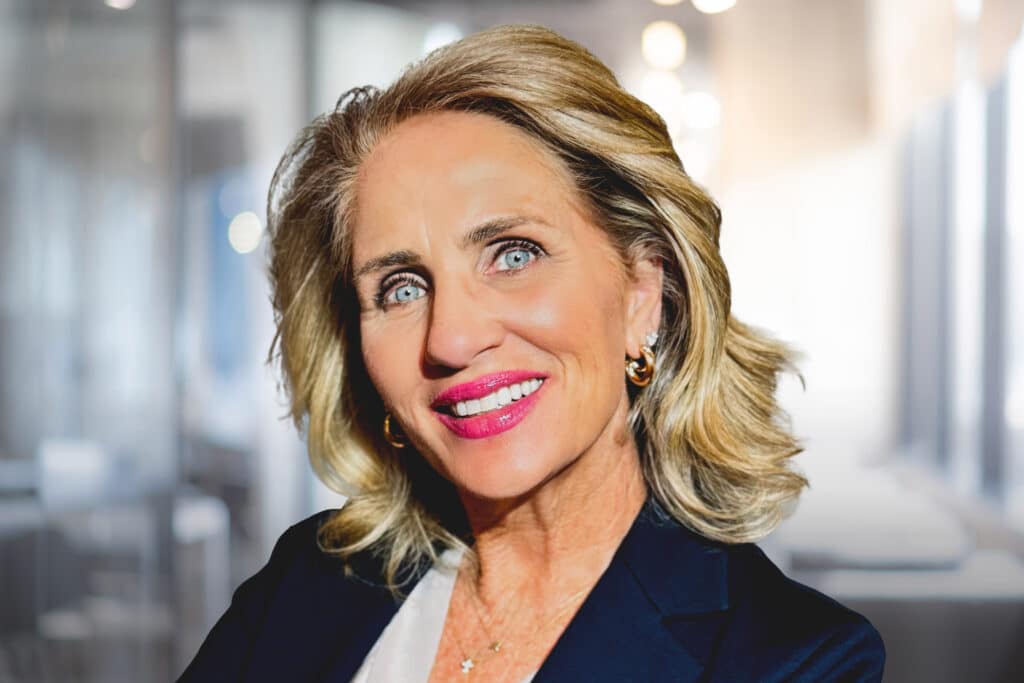
Hanson’s Guardian Sports is a family-owned company dedicated to serving athletes through safety and performance improvements in sports equipment. Major products include the Guardian Cap, PEARL ball and Guardian Infill serving the sports industry.
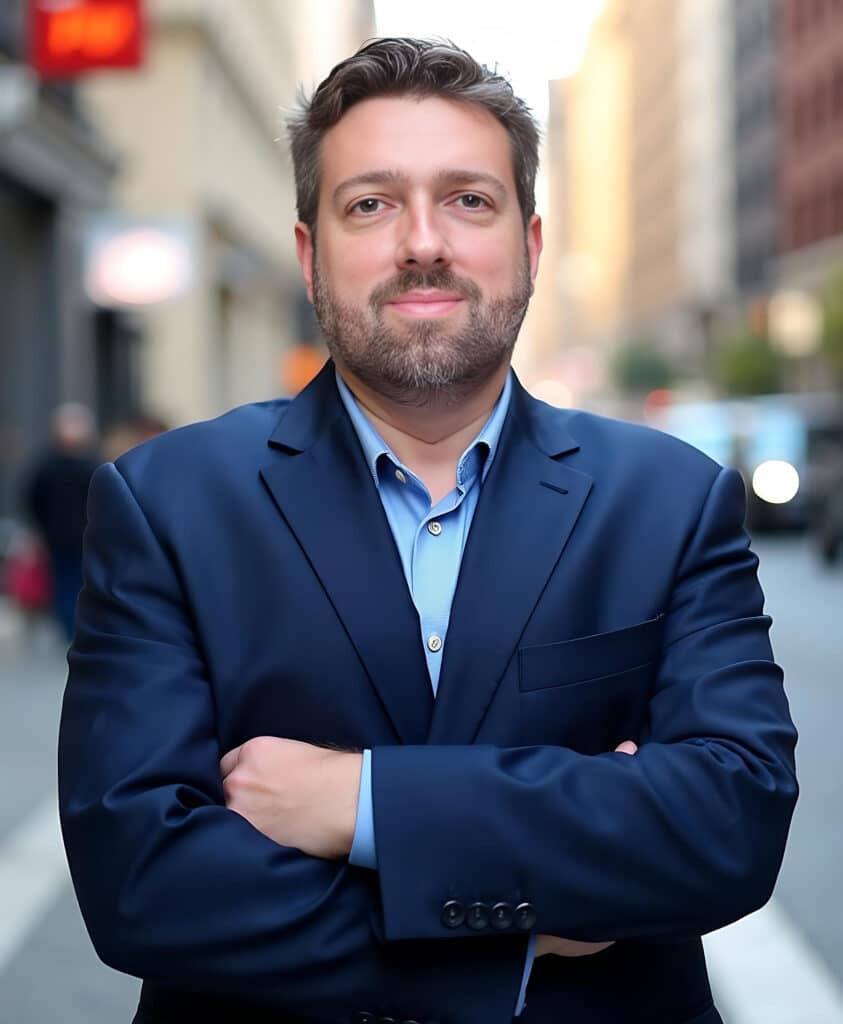
DLB Associates is a U.S.-based consulting engineering firm specializing in mission-critical and complex built environments. With more than 40 years of expertise, DLB delivers innovative, technology-driven solutions in engineering, commissioning and operations worldwide.
Celebrating entrepreneurial leaders
Now in its 40th year, Entrepreneur Of The Year recognizes the bold leaders who disrupt markets through the world’s most ground-breaking companies, revolutionizing industries and making a profound impact on communities. The program honors those entrepreneurs whose innovations shape the future and pave the way for a thriving economy and a hopeful tomorrow.
The Southeast program celebrates entrepreneurs from Alabama, Georgia, North Carolina, South Carolina and Tennessee.
An independent panel of judges selected 36 finalists for their entrepreneurial spirit, purpose, growth and lasting impact in building long-term value.
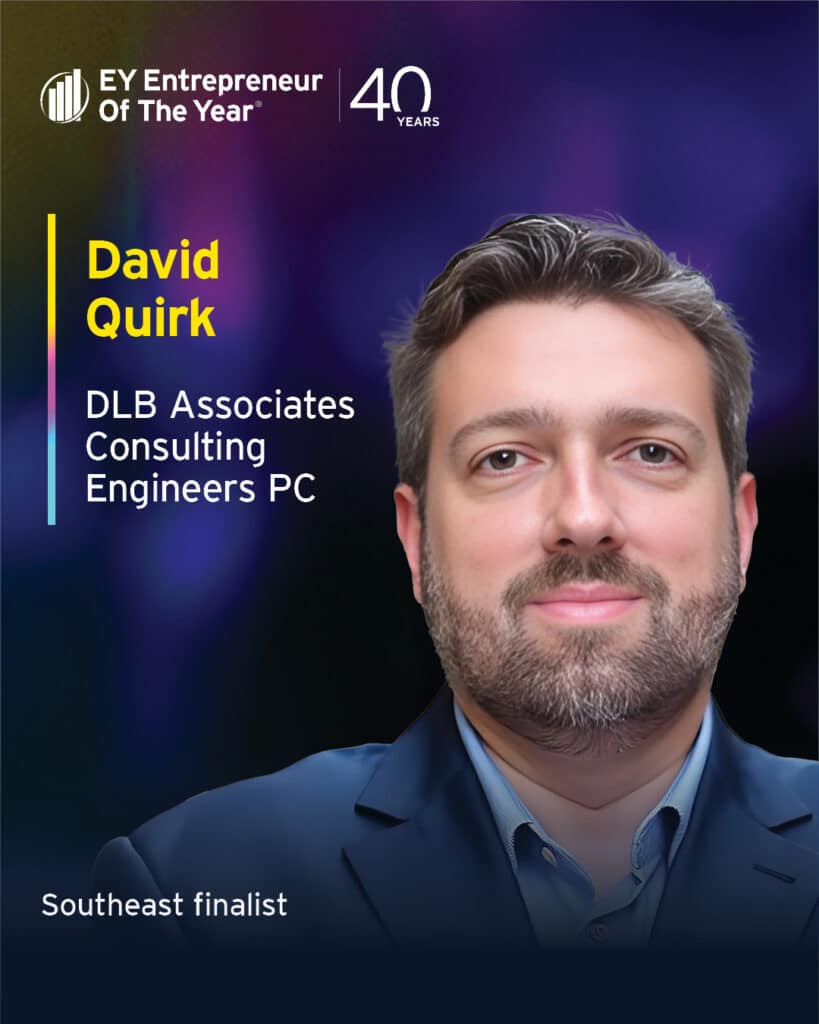
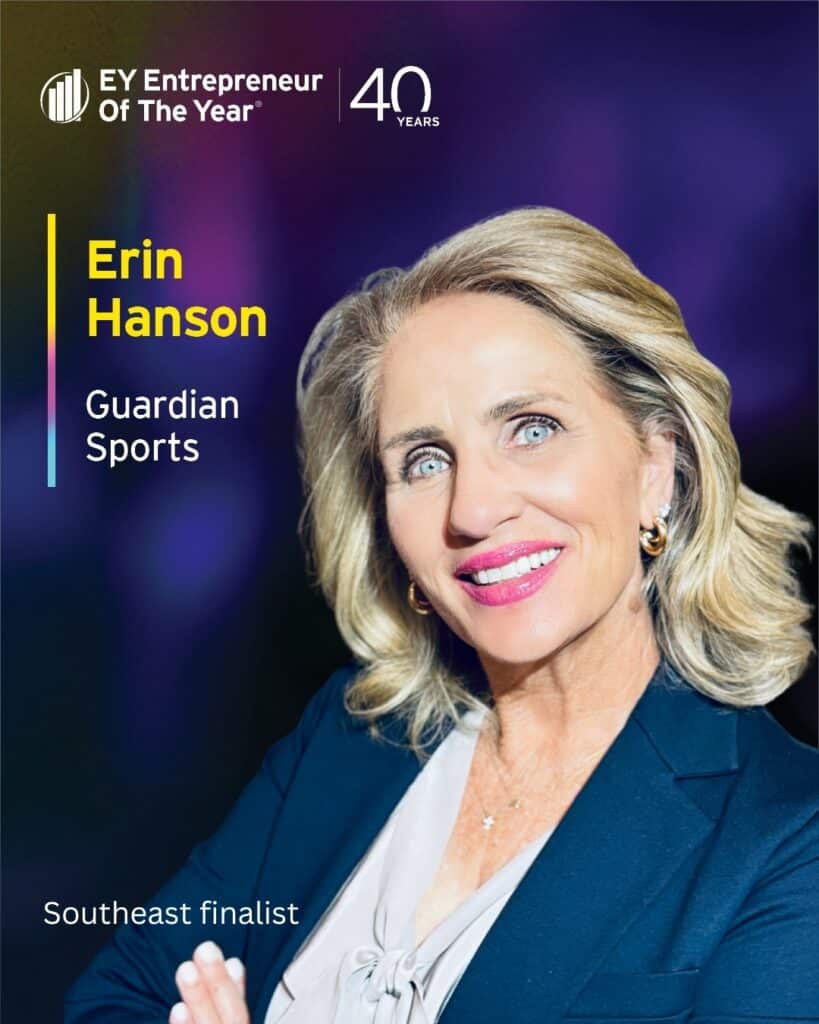
“This year’s finalists are leading examples of innovation, perseverance and resilience, illuminating paths to a brighter future for their industries and communities,” said Chevy Arnold, Entrepreneur Of The Year Southeast Program co-director.
“Their commitment to excellence transforms challenges into opportunities, inspiring us all,” added Kimberly Kicklighter, Entrepreneur Of The Year Southeast Program co-director.
Entrepreneur Of The Year honors many different types of business leaders for their ingenuity, courage and entrepreneurial spirit.
The program showcases original founders who bootstrapped their business from inception or who raised outside capital to grow their company; transformational CEOs who infused innovation into an existing organization to catapult its trajectory; and multigenerational family business leaders who reimagined a legacy business model to strengthen it for the future.
Including Quirk and Hanson, the 2025 Southeast finalists are:
- Marc Hodulich | 29029 | Atlanta, Georgia
- Damon Stafford | Alpine Intel | Charlotte, North Carolina
- Lou Hensley | Aspida | Durham, North Carolina
- Matthew Dent | Buffalo Rock Company | Birmingham, Alabama
- Melanie Little | Colonial Pipeline Company | Alpharetta, Georgia
- Will Bartholomew | D1 Training | Franklin, Tennessee
- Rene Diaz | Diaz Foods | Atlanta, Georgia
- David Quirk | DLB Associates Consulting Engineers PC | Peachtree Corners, Georgia
- Markus Scott | EyeQ Monitoring | Atlanta, Georgia
- Jon Gosier | FilmHedge | Atlanta, Georgia
- John Fitzpatrick | Force Marketing | Atlanta, Georgia
- Dr. Barry Patel | Galt Companies | Atlanta, Georgia
- Dr. Wade Smith | Galt Companies | Atlanta, Georgia
- Charles Gillespie | Gambling.com Group | Charlotte, North Carolina
- Kevin McCrystle | Gambling.com Group | Charlotte, North Carolina
- Mike Griffin | Griffin Brothers Companies | Cornelius, North Carolina
- Erin Hanson | Guardian Sports | Peachtree Corners, Georgia
- Dan Beem | Hissho Sushi | Charlotte, North Carolina
- Aaron Siegel | Home Team BBQ | Charleston, South Carolina
- Marc Murphy | Ignite Digital Services | Charleston, South Carolina
- Miller Chalk | Inglett & Stubbs, LLC | Mableton, Georgia
- Liza Rodewald | Instant Teams | Southern Pines, North Carolina
- Stephen Andresen | McClancy Foods & Flavors | Fort Mill, South Carolina
- Travis LeFever | Mission Mobile Medical Group | Greensboro, North Carolina
- Cyrus Mojdehi | Northway Homes | Charlotte, North Carolina
- Connor Ryan | NutraSky | Alpharetta, Georgia
- Fritz Owens | OTR Solutions | Roswell, Georgia
- Christopher Chuang | Relay, Inc. | Raleigh, North Carolina
- Kurt Jacobus | restor3d, Inc. | Durham, North Carolina
- Tom Kendrot | Shearwater Health | Nashville, Tennessee
- Teak Shore | Southern Lighting Source | Cumberland, Georgia
- Cindy Eckert | Sprout Pharmaceuticals | Raleigh, North Carolina
- Bryan Moore | TalkShopLive Inc. | Nashville, Tennessee
- Tina Moore | TalkShopLive Inc. | Nashville, Tennessee
- Igor Marinelli | Tractian | Atlanta, Georgia
- Joan Butters | Xsolis | Franklin, Tennessee
You can learn more about the finalists at ey.com/en_us/entrepreneur-of-the-year-us/southeast/winners-finalists.
Regional award winners will be announced on June 25 during a special celebration. The winners will then be considered by the national independent panel of judges for the Entrepreneur Of The Year National Awards, which will be presented in November at the annual Strategic Growth Forum®, one of the nation’s most prestigious gatherings of high-growth, market-leading companies.

About Entrepreneur Of The Year
Founded in 1986, Entrepreneur Of The Year has celebrated more than 11,000 ambitious visionaries who are leading successful, dynamic businesses in the U.S., and it has since expanded to nearly 60 countries globally.
The U.S. program consists of 17 regional programs whose panels of independent judges select the regional award winners every June. Those winners compete for national recognition at the Strategic Growth Forum® in November where national finalists and award winners are announced.
The overall national winner represents the U.S. at the EY World Entrepreneur Of The Year™ competition.
For more about the award, visit ey.com/us/eoy.
Related
Business
SCB Construction Group Partners with CGA Reps on New Peachtree Corners HQ
Published
4 weeks agoon
April 15, 2025
SCB Construction Group, freshly rebranded from SteelCo, secures construction project with CGA Reps for new office HQ in Peachtree Corners
SCB Construction Group has announced a strategic partnership with CGA Reps to build a new office headquarters in Peachtree Corners. The project, encompassing approximately 26,000 square feet of innovative workspace, marks a significant milestone in advancing CGA Reps’ corporate vision while showcasing SBA Construction Group’s commitment to delivering transformative construction solutions.
In collaboration with Oakley Real Estate Partners — serving as developers of the project on behalf of CGA Reps — this venture reflects a united effort to bring cutting-edge design (from Smallwood architecture firm) and operational excellence to the commercial kitchen equipment industry.
The announcement follows several high-profile projects for SCB Construction Group in 2024, including a 72,500-square-foot manufacturing center and headquarters for Process Equipment & Controls, an impressive interior build-out for Courtesy Ford Conyers’ commercial service center and the Phase 1 completion for StoreEase Loganville — recently honored as a 2024 Smart Facility of the Year by Modern Storage Media.
A bold new chapter for CGA Reps
The new 25,890-square-foot headquarters is designed to be more than just a workplace — it is envisioned as an inspiring environment that serves both client engagements and employee creativity. CGA Reps is recognized as an industry expert in commercial kitchen equipment, representing leading manufacturers, warehousing, distributing and installing everything from fryers to commercial walk-in freezers.
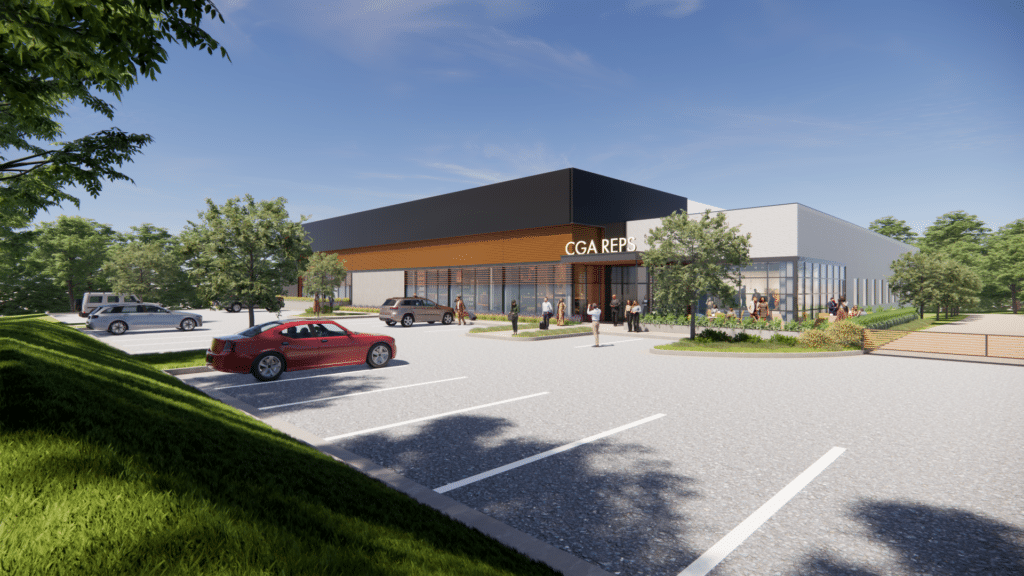
The facility’s design reflects this expertise, featuring a dedicated approximately 9,000-square-foot showroom kitchen that will host equipment demonstrations, tradeshows and webinars. This dynamic space will allow CGA Reps to showcase its comprehensive product range and provide clients with hands-on experiences of the latest commercial kitchen innovations.
A standout feature of the project is its innovative approach to stormwater management. With the site comprising only three acres, sufficient space for a traditional detention pond does not exist. To overcome this challenge, the design includes an underground detention system located beneath the truck court to efficiently handle all stormwater runoff.
This solution not only maximizes the use of the available land but also reinforces CGA Reps’ commitment to sustainable practices.
“We are excited to embark on this project with CGA Reps,” said Jay Bailey, CEO of SCB Construction Group. “This partnership underscores our commitment to customer excellence in design and construction, and it is a testament to the trust our clients place in our ability to deliver projects that not only meet but exceed expectations.”
Delivering excellence through proven expertise
SCB Construction Group’s track record in 2024 has been nothing short of remarkable. Earlier in the year, the company completed a 72,500 square foot manufacturing center for Process Equipment & Controls, integrating office space within a dynamic production facility.
This project was celebrated for its innovative design that balanced operational efficiency with a modern aesthetic, utilizing IMP panels to mimic tilt-up concrete, setting new standards for manufacturing environments.
Similarly, the interior build-out for Courtesy Ford Conyers’ commercial service center demonstrated SCB Construction Group’s ability to transform conventional spaces into functional and attractive environments that cater to both customer and staff needs.
The company’s commitment to quality and precision was again evident in the successful Phase 1 completion for StoreEase Loganville. This project, which recently earned the distinction of a 2024 Smart Facility of the Year by Modern Storage Media, highlights SCB Construction Group’s forward-thinking approach to construction and design, incorporating smart technologies and design that enhance sustainability and operational efficiency.
A rebranding that reflects a vision for the future
In a move that signals its evolution and growth, SCB Construction Group has recently rebranded from its former identity, SteelCo Buildings, as it spins off its construction division. This strategic rebranding is not merely cosmetic — it represents a renewed commitment to capabilities, credibility and client-focused service.
The refreshed brand is anchored by a new tagline “Deep Expertise, High Expectations” and a clear brand promise that communicates the company’s mission: to craft exceptional construction experiences based on precision, innovation and trust.
“Our rebranding is about more than just a new name or logo; it’s a renewed promise to our clients and communities,” explained Robert Lee, marketing director at SCB Construction Group. “We believe that our updated brand identity, including our invigorated tagline and mission statement, encapsulates our dedication to pushing the boundaries of design and construction. It reflects our commitment to creating spaces that are as inspiring as they are functional.”
Transforming spaces to inspire and connect
The new headquarters for CGA Reps is expected to become a landmark facility in Peachtree Corners. Beyond its impressive architectural design and advanced construction techniques, the building is planned as a hub for innovation and collaboration.
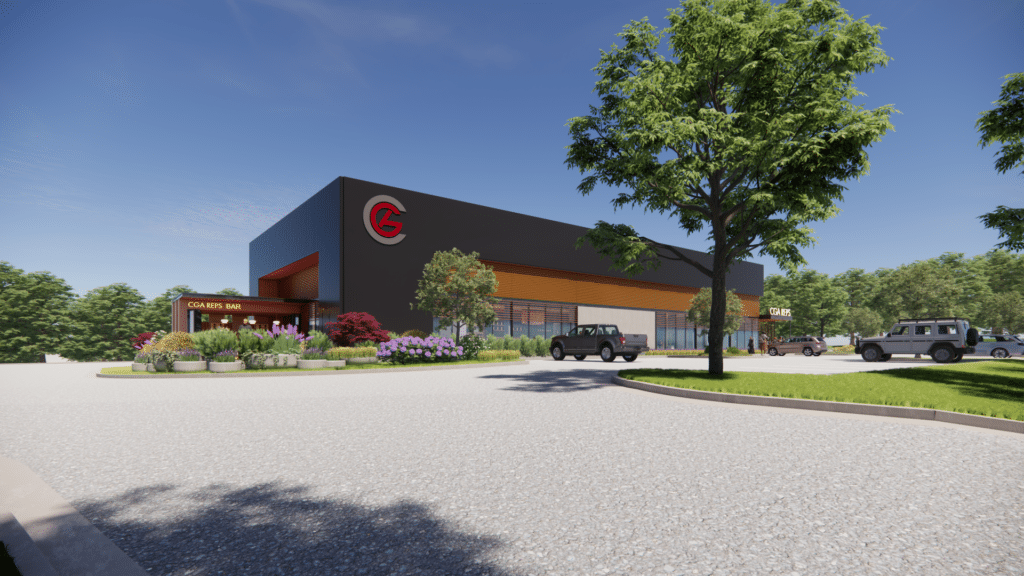
The interior build-out will include dynamic client reception areas, interactive meeting rooms, and dedicated spaces designed to foster creativity and teamwork among employees. The layout is crafted to ensure that every area of the facility contributes to a productive and inspiring work environment.
“By investing in this state-of-the-art facility, CGA Reps is making a strong statement about the future of work,” said Bryan Young, VP of construction at SCB Construction Group. “Our team is dedicated to designing and building spaces that not only serve the immediate needs of our clients but also create environments that motivate and inspire. The new headquarters will be a testament to that vision.”
Looking ahead
The partnership between SCB Construction Group and CGA Reps marks a significant step forward for both companies. As SCB Construction Group continues to build on its legacy of excellence and innovation, this project is poised to set a new benchmark for modern office headquarters design in the region.
With a strategic focus on creating spaces that inspire, connect and drive success, the future looks promising for both SCB Construction Group and its esteemed partner, CGA Reps.
For more information on the new headquarters project or to learn more about SCB Construction Group’s portfolio, visit scbcg.com.
Related
Read the Digital Edition
Subscribe
Keep Up With Peachtree Corners News
Join our mailing list to receive the latest news and updates from our team.
You have Successfully Subscribed!

Katherine Lafourcade — A Journey of Passion, Resilience and Giving Back

GA Tech Launches First-of-its-Kind GT Atrium in Peachtree Corners

Digital Edition

PCBA Announces 2025 Scholarship Winner

Paul Duke STEM High School Student Earns CGO Scholarship

Official City Merchandise Line Debuts This Saturday at Town Green

World Blood Donor Day Starts Here: Theo’s Miracle, Katherine’s Mission [Podcast]

Peachtree Corners Grows Business Opportunities Through Economic Development

City of Peachtree Corners Awarded Certificate of Achievement From GFOA for Seventh Straight Year

Simpson Elementary Marks Exceptional Children’s Week

Executive Function: A Tribute to Working Moms

Official City Merchandise Line Debuts This Saturday at Town Green

Peachtree Corners Grows Business Opportunities Through Economic Development

Digital Edition

World Blood Donor Day Starts Here: Theo’s Miracle, Katherine’s Mission [Podcast]

Paul Duke STEM High School Student Earns CGO Scholarship

Light up the Corners [Video]

Capitalist Sage: Business Leadership in Your Community [Podcast]

Cliff Bramble: A Culinary Adventure through Italy

Top 10 Brunch Places in Gwinnett County

A Hunger for Hospitality

THE CORNERS EPISODE 3 – BLAXICAN PART 1

Top 10 Indoor Things To Do This Winter

The ED Hour: What it takes to Remove Barriers from Education

Peachtree Corners Life
Topics and Categories
Trending
-
City of Peachtree Corners4 days ago
Official City Merchandise Line Debuts This Saturday at Town Green
-
Business4 days ago
Peachtree Corners Grows Business Opportunities Through Economic Development
-
Community4 days ago
Executive Function: A Tribute to Working Moms
-
Community3 days ago
Simpson Elementary Marks Exceptional Children’s Week





